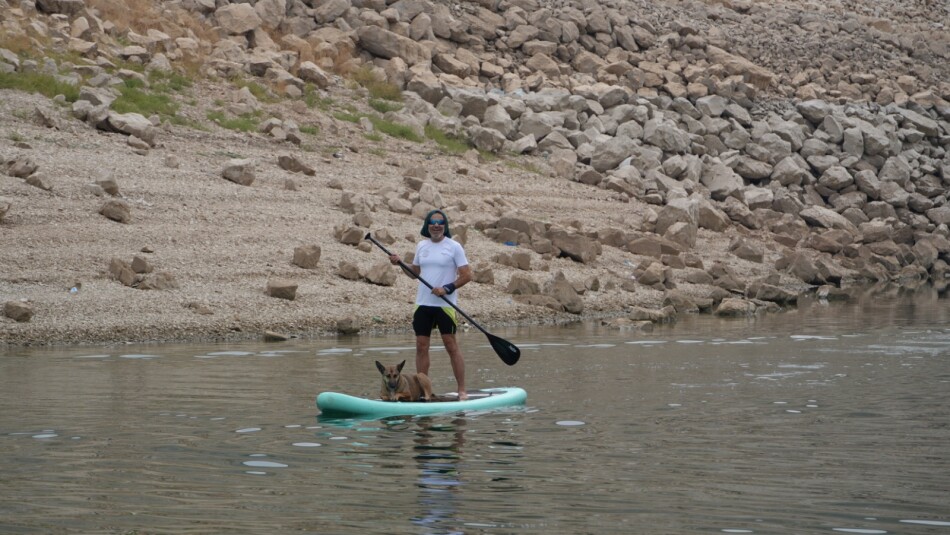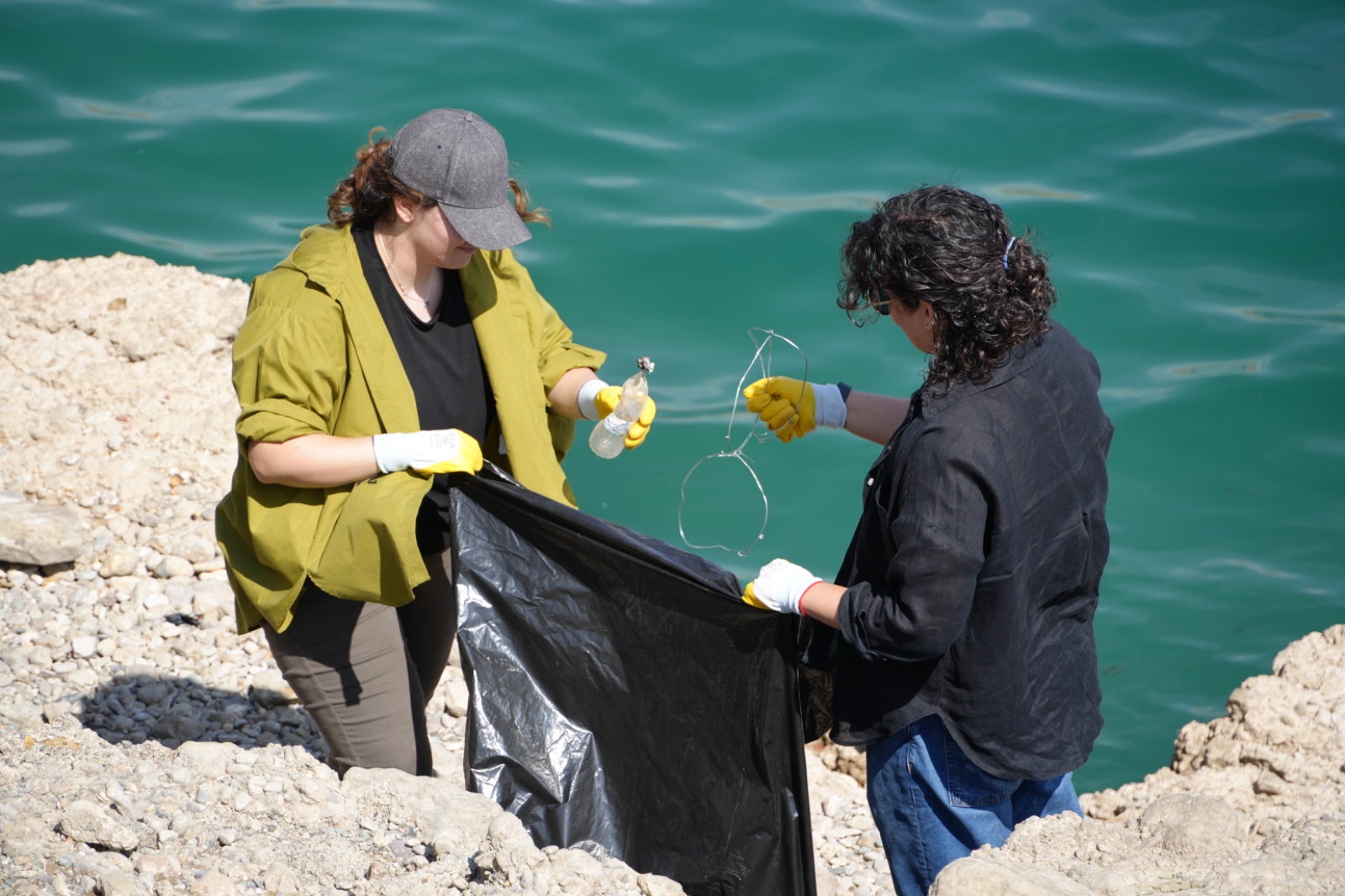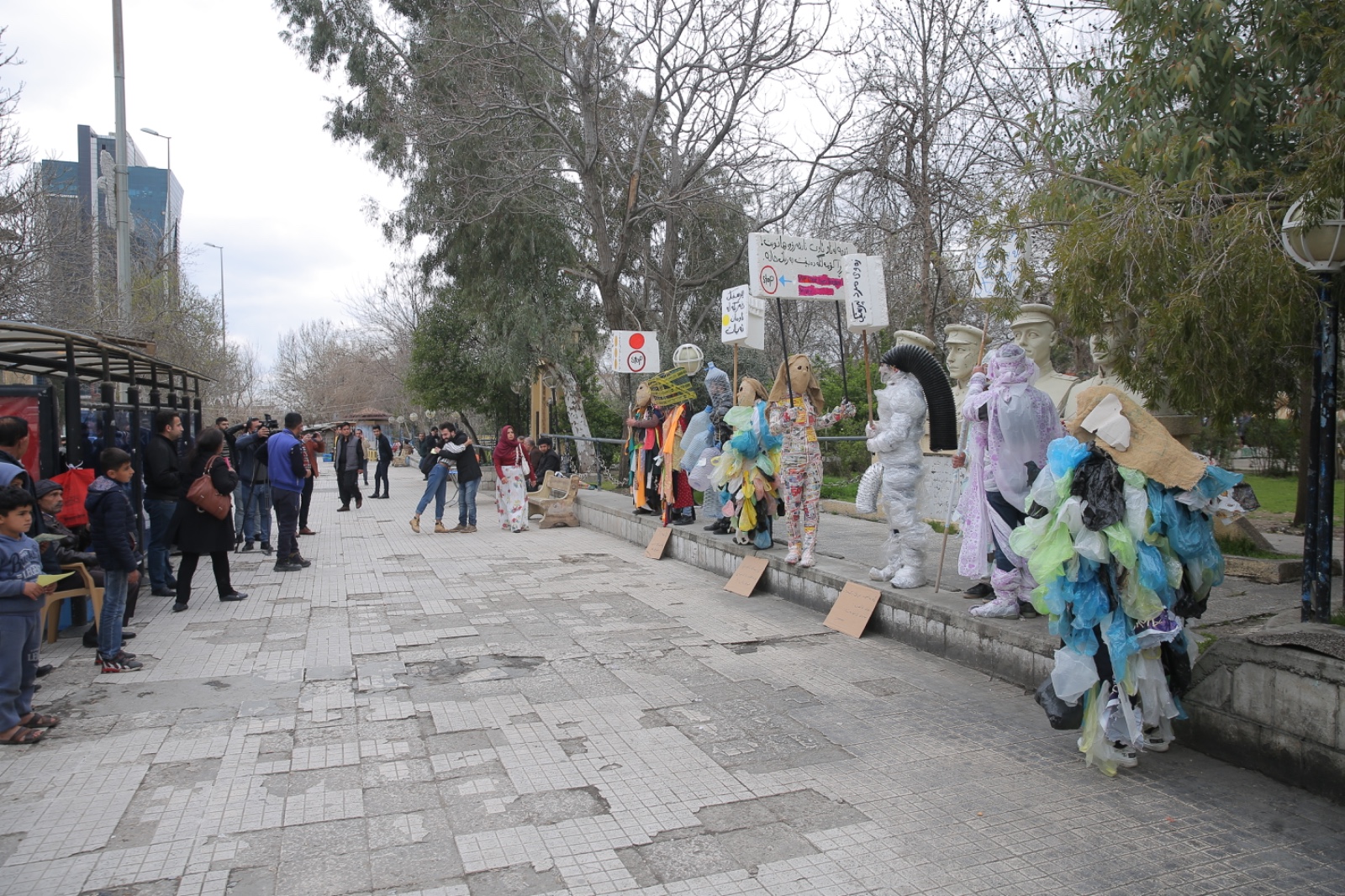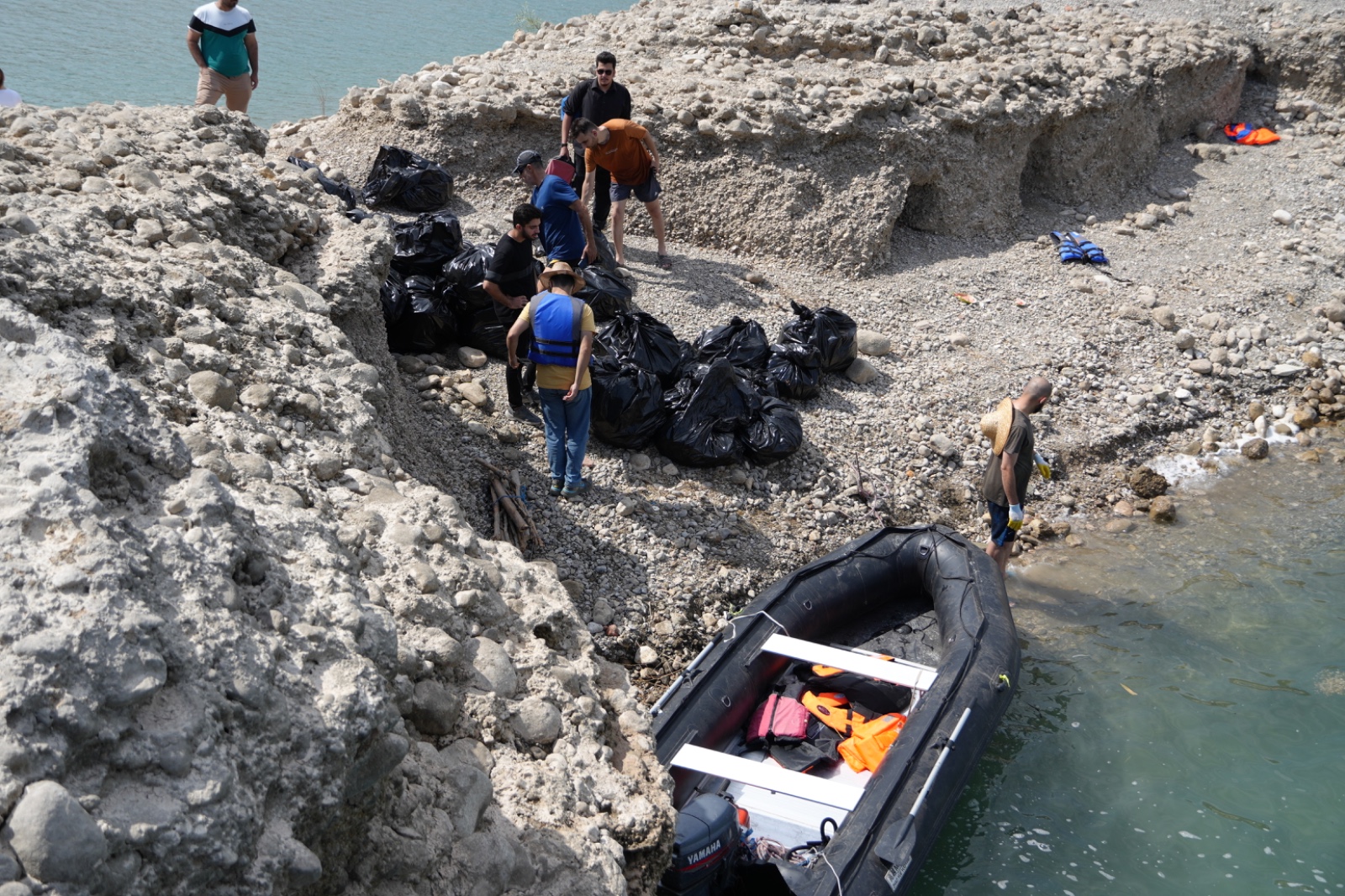
If the water of a river or dam is not “drinkable, swimming and fishing-friendly,” it is not called “fresh water,” according to Nabil Musa, who has been working for 14 years to preserve fresh water through the Iraqi-Kurdistan Water Guardians Organization, in a country that lacks public awareness about environmental issues.
His initiative to preserve water resources comes at a time when the United Nations indicates that 884 million people in the world are deprived of safe drinking water, and 2.5 million people are deprived of using healthy water.
The problem of fresh water scarcity in the world has become a threat to the lives of animals and plants and a nightmare for the entire ecosystem.
The United Nations expects, based on its data, that 5.01 billion people out of 10 billion people, over half of the world’s population, will be exposed to the problem of water scarcity by 2050.
Based on these facts, Musa announced the establishment of the first organization to protect water resources in Iraq. The organization's activities consist of water source cleaning campaigns, spreading awareness, and forming water protector teams in different areas.
The story began 14 years ago
The story of the establishment of the Iraq-Kurdistan Water Guardians Organization dates back to 2014 when Nabil Musa discussed with a water conservation expert the issue of the disappearance of the Sarchinar water source in Sulaymaniyah Northern Province.
"From here, I thought about how to work to protect water sources, that expert encouraged me."
The establishment of the organization coincided with activities organized by a number of environmental activists on the issue of reviving the marshes of southern Iraq, which were dried up and destroyed in the 1990s by a decision of the dissolved Baath Party leader Saddam Hussein, which led to the displacement of no less than 200,000 people from the marshlands.
"Our work program includes developing an effective plan to protect and monitor water sources, in addition to raising community awareness about the importance of maintaining the cleanliness of water sources," Mua said.
"We care about maintaining the cleanliness of water sources so that they are suitable for drinking, swimming, and fishing... because without these three things, they cannot be considered fresh water."
Musa studied art so he wants to mix the environment with art, for example, sometimes he spreads environmental awareness through festivals, theater, acting, boat museum and documentaries.

One of the activities of the Iraq- Kurdistan Water Guardians Organization, September 2024, Sulaymaniyah. Media of the Organization
On November 30, 2024, his organization participated in a show for the Iraqi-Kurdistan Water Guardians at the Basra Boat Heritage Festival.
"The festival was an important opportunity to reconcile the new generation and introduce them to the heritage and culture of Iraq and the simple ways of living next to rivers," Musa added.
"We launch campaigns from time to time to clean and dredge water sources, where we call on everyone through social media networks to participate, young and old, women and men, even school children to participate in these campaigns."
Cooperative work is a source of inspiration
The organization launched several campaigns this year to clean water sources in the Kurdistan Region of Iraq KRI, including the Seagull Island in Lake Dukan, Ahmed Awa Waterfall, Razan Lake and Kani Shok Spring, and before that they had events in both Tanjaro and Darbandikhan.
These campaigns have inspired dozens of young people who work in groups to clean water sources.
Over 200 volunteers participated in the four campaigns, Musa affirmed.
Sana Omar, who participated with the organization in two cleaning campaigns as a volunteer, said that the teamwork made her happy. "One of the campaigns was in Dukan Lake on September 7, 2024, and the other on September 21 in Seagulls Island."
"We made strenuous efforts, but it was a source of inspiration... Unfortunately, we found a lot of waste left by tourists on Dukan Island... I was thinking that the cattle have to look for grass among the plastic waste," she added.
Varying amounts of waste are collected depending on the area we are cleaning, "For example, we collected 80 bags full of waste on the destroyed castle island in the middle of Dukan Lake, sometimes we fill more than 150 bags with waste."
The waste that is suitable for use as animal feed is left in a suitable place, especially that which fish and turtles feed on, while the rest is transported to another location far from the water source.
The number of volunteers in the two campaigns in which Omar participated reached 50 people.
"Before heading to participate in the campaign, I thought that the sites we clean may return to what they were after a few days, but we can become a source of inspiration for the rest of the people to realize the importance of preserving the environment," Omar proudly said.

Reconciling people with nature
The Iraq-Kurdistan Water Guardians Organization relies on boats that are rowed by hand in order to perform its work, so they are environmentally friendly and do not depend on fuel-powered engines.
The organization also established the Mountains and Plains Club. "The goal is to reconcile the Kurdish individual with nature... Our work is like psychological therapy that brings peace in search of better health."
Participants in these activities stay in the middle of the water inside their boats for a period of time, and this requires them to have the physical capabilities to row and cover distances to reach the intended destination.
"In this way, we reconcile with nature, and at the same time, this represents a financial source that the organization depends on."
According to statistics from the General Directorate of Water Resources in the Kurdistan Region, only 10 to 20% of the water in the KRI is treated, which means that 80% percent of the water sources goes untreated.
For example, the Tanjaro River, which is located south of the city of Sulaymaniyah, is polluted by sewage and waste from factories and refineries that flow into it.
The river water then flows into Lake Darbandikhan and the Sirwan River, which are considered a source of drinking water for hundreds of thousands of residents, including residents of the districts of Kalar and Darbandikhan.
Khaled Suleiman, an environmental expert, says that the pollution of water sources affects the health of humans, animals and plants. "Livestock and agricultural crops are sources of income for us, and in this case we are exposed to health and economic damage."
Thinking about subsequent steps
Musa’s NGO is working to establish a pilot heavy water refinery for the benefit of universities project, which is currently being halted due to lack of financial resources.
The project consists of a number of large tanks, about two meters wide and seven meters high. The sewage water from houses is purified in these tanks from chemicals and methane gas, and at the last tank, the water purity rate reaches 80%.
"The project receives automatic support from donors. Half of the project has been completed, but the lack of financial resources has led to the project being halted at the present time," according to Musa.

One of the activities of the Iraq-Kurdistan Water Guardians Organization, Sulaymaniyah, September 2024. Media of the Organization
The political geography of the rivers of the KRI has imposed that the main branches of the rivers and streams flow from outside the borders of the region, as most of them enter the region from Iran and Turkey.
The region enters 4 billion cubic meters of water from Iran and 25 billion cubic meters from Turkey, and according to the data and figures of the Kurdistan Regional Government KRG, this water constitutes 61% of the water resources in the Kurdistan Region, leaving only 18 billion cubic meters, or 39% of the water that originates within the region.
There are always concerns about the decrease in the amount of water entering the region from neighboring countries, while the domestic water is also at risk due to mismanagement and lack of awareness among citizens.
"Our water management policy is not fixed and long-term, we care about water according to the circumstances, water management is not just about building dams, but rather a comprehensive and multi-faceted process," said Suleiman.
"Urban wastewater can be invested in irrigating gardens and green spaces, as large amounts of this water are wasted annually."
While climate change has led to a decrease in rainfall rates in the region, with rainfall falling from 526.3 mm in 2012 to 347.1 mm in 2022.
Quick risks and slow solutions
About 14.5% of the water consumed in any country is wasted due to evaporation, with the amount of evaporated water in the world reaching about 15.7 billion cubic meters.
Temperatures in Iraq are rising 2 to 7% faster than in the world. If the temperature rises by one degree Celsius and rainfall decreases by 10% by 2050, fresh water may decrease by 20%.
This could mean that water sources will be non-existent for nearly a third of the world's Arable land in Iraq by 2050.
Ari Ahmed, the Director of Water and Sewerage in the Kurdistan Region, says that the international standard for the amount of water consumed per person per day ranges between 200 and 250 liters, "but the current consumption of one person in the Kurdistan Region ranges between 350 and 400 liters of water."
"To preserve these water resources, we need snow and rain and to ensure that the region receives its share of water from neighboring countries."
Musa admits that what they are doing is not the solution to the problem of water pollution in Iraq and the Kurdistan Region, but he stresses that it is "the beginning of the solution through educating people and alerting the relevant authorities."
The biggest problem facing the organization, according to Nabil, is "the lack of a system in place to protect water. What we are doing is just a cry for help."
"The government is aware of our activities and events, but it has not coordinated with us or provided us with support. Nevertheless, we submit annual reports to them on the status of pollution."
The Director of Water and Sewerage in the Kurdistan Region believes that the issue of protecting water resources is the responsibility of all relevant ministries in the government.
He explained that the Water and Sewerage Directorate is not aware of the organization's activities and said, "We do not work with them."
Musa says that another problem they face is "the lack of awareness of people," noting that the areas in which they carry out cleaning campaigns return to their former state after a few months.